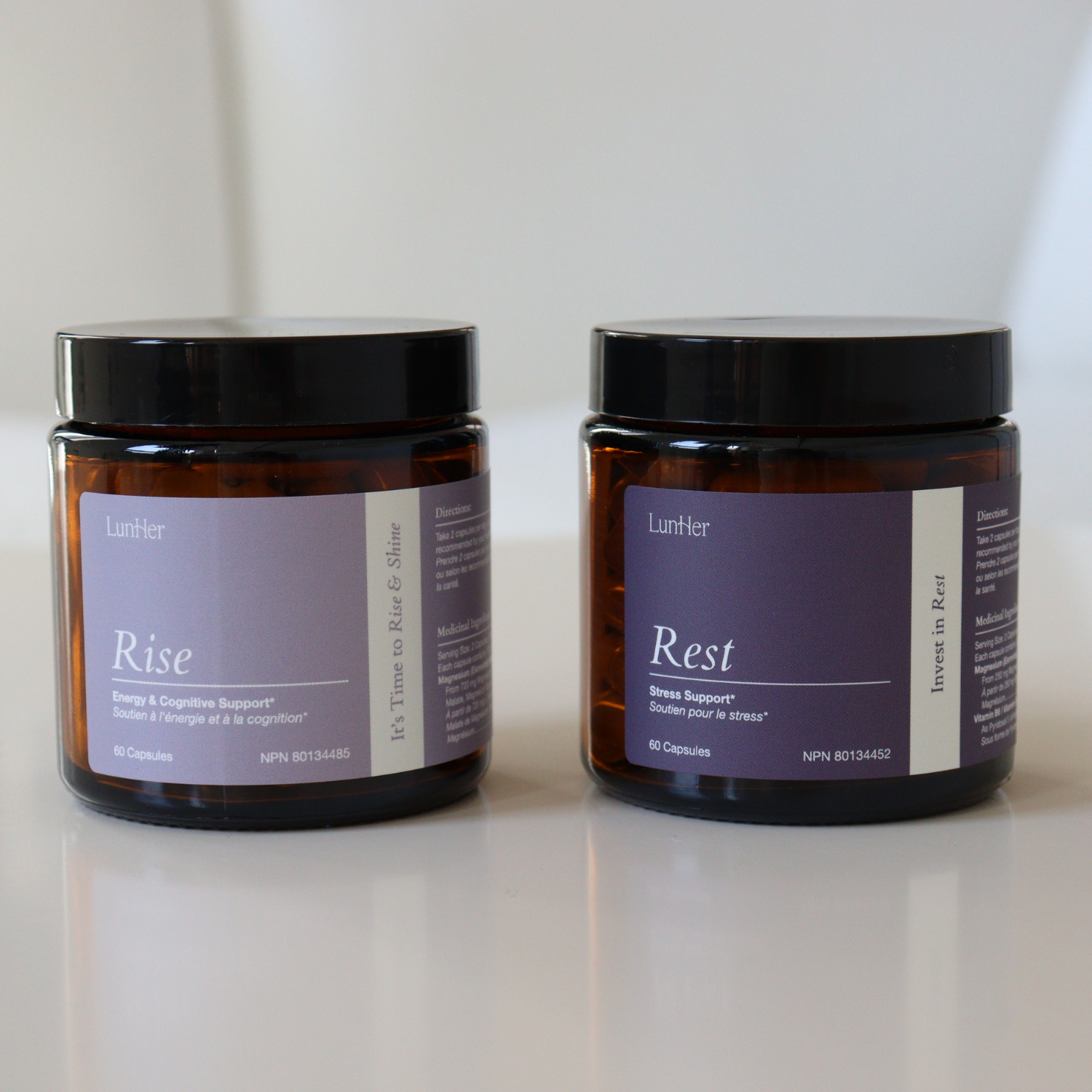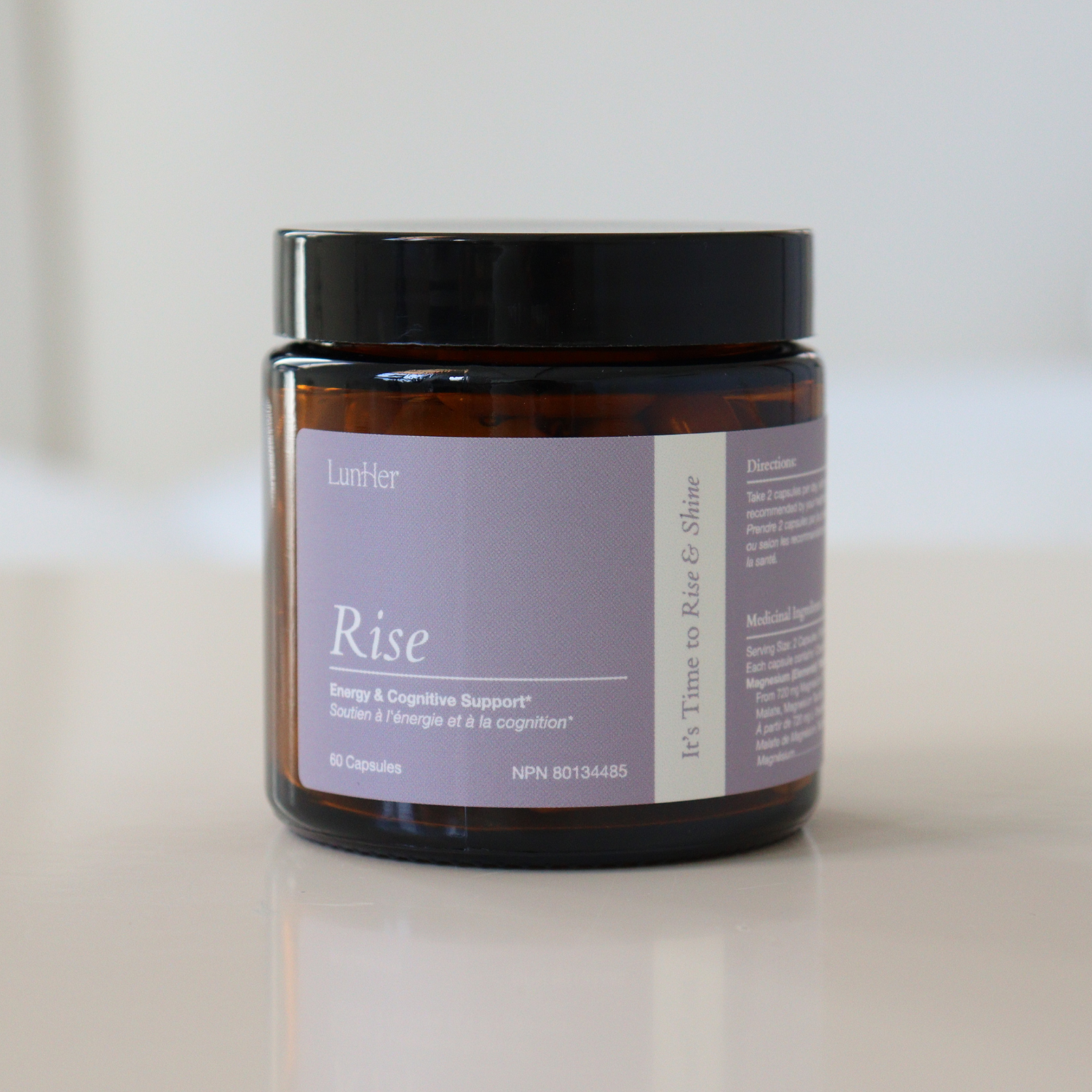
What are the Benefits of Vitamin B6?
When it comes to vitamins that do a lot behind the scenes, Vitamin B6 quietly earns its place at the top. From supporting mood and energy to promoting hormone balance and heart health, this vitamin does a lot. Let’s break down what Vitamin B6 does, why it matters, and how to know if you need more of it in your daily routine.
The LunHer Take
Vitamin B6 is an important vitamin that plays a role in over 100 enzyme reactions in your body.
It’s important to get enough B6, either through diet or supplements, because a lack of vitamin B6 can cause many serious side effects.
There are many health benefits to taking vitamin B6 including mood regulation, energy, brain health, and may even help reduce PMS symptoms and pregnancy nausea.
Why is Vitamin B6 Important?
Vitamin B6, also known as pyridoxine, is a water soluble vitamin that plays a role in over 100 enzyme reactions in your body. It’s found in many different kinds of foods, including salmon, chickpeas, and chicken. But that doesn't mean you're getting enough of it. A lack of vitamin B6 can cause many serious side effects, so getting enough in your diet is important.
Vitamin B6 is just one of the many vital B vitamins your body needs. It helps to keep your blood oxygenated and is equally important for your immune system to function optimally. Vitamin B6 also helps in the creation of a neurotransmitter called dopamine, which is also known as the "happy hormone." That's why vitamin B6 is hailed for its mood-promoting properties. Another important reason to keep your B6 levels optimal is that it helps turn the food you eat into the energy your body needs. This can support your energy levels.
If you're not getting enough B6 through your regular diet, it might be time to consider supplementing with a convenient vitamin pack.
Signs You May Be Low on B6
Most people at risk for deficiency include those with digestive issues that can impact nutrient absorption, pregnant people, those with kidney issues, and use of certain medications can deplete vitamin B6.
Symptoms of low B6 might include:
-
Fatigue or low energy
-
Brain fog
-
Mood swings or low mood
-
Trouble sleeping
-
Dry, flaky skin or chapped lips
-
Occasional confusion or forgetfulness
If you're experiencing many of these symptoms, you can always ask your doctor to perform a blood test to see if you are deficient in B6 or any other nutrients. Once your deficiency is identified, starting to incorporate the proper nutrients into your diet, through food or a supplement, can help you maintain optimal health.
The good news is that B6 is easy to supplement and the benefits are worth it. How much you need depends on factors such as gender and age. Your weight and height should also be taken into account when deciding on the right dosage of vitamin B6. Side effects can occur when your vitamin B6 dosage is incorrect.
7 Health Benefits of Vitamin B6
Vitamin B6 is a powerful vitamin when it comes to boosting your health. Once you begin taking the correct dosage, you'll notice the benefits very quickly. Let’s take a closer look at how this underrated nutrient helps support your whole-body wellness, especially when life feels like a lot.
-
May Boost Mood and Manage Symptoms of Occasional Mental Tension
Your brain needs B6 to produce feel-good neurotransmitters like dopamine and serotonin so it is believed to have mood-enhancing benefits. These particular neurotransmitters can help to regulate emotions, which makes them important for boosting your mood when experiencing occasional mental nervousness or tension as a result of poor nutrient status.
-
Promotes Brain & Cognitive Health
Vitamin B6 plays a key role in the functioning of the brain and supports its overall health. The increase in neurotransmitters made by vitamin B6 is important for your brain's health. Not only can it balance your mood as mentioned above, but it may even help to manage occasional brain fog and mental fatigue.
-
Aids Hemoglobin Production and Blood Circulation
One of the most important functions of vitamin B6 is its role in maintaining good blood health. B6 helps to create red blood cells which are vital for transporting oxygen throughout your body. Additionally, vitamin B6 helps to promote and develop hemoglobin in your blood. This is the part of the blood that transports oxygen from the lungs to the blood and around your body, so it is important for your health. Vitamin B6 regulates the number of amino acids in your blood. These are the building blocks of protein, and so your blood must be able to correctly regulate them.
-
May Help Ease PMS Symptoms
If your cycle leaves you feeling moody, bloated, or fatigued, vitamin B6 may help to relieve some of these symptoms. Studies have suggested that people who experience PMS often don't have enough of this chemical in their bodies. This implies that having sufficient B6 levels may help manage PMS symptoms. The clinical trials done with B6 supplementation to manage PMS symptoms show potential but more studies need to be done.
-
Supports Nausea Relief During Pregnancy
Pregnancy-related nausea can be intense but vitamin B6 may combat this nausea. Research suggests it can help reduce symptoms without harming the fetus, which is why it’s often included in prenatal vitamins or taken as a stand-alone supplement. Always check with your healthcare provider before starting anything new during pregnancy.
-
Protects Heart Health
Another important function of vitamin B6 is its role in maintaining a healthy heart. Vitamin B6 can help to manage homocysteine levels in your blood. When there is too much of this chemical it can cause blood vessel issues, which means your heart has to work harder to pump blood through your body. By managing the homocysteine levels in your blood, vitamin B6 can boost your overall heart health.
-
Promotes Eye Health
We rarely think about our eye health until something starts to change. Maintaining the right dosage of vitamin B6 in your body can help to promote eye health before issues begin to occur by promoting healthy blood flow throughout the body, including the eyes.
Vitamin B6 has been shown to support eye health even as you age. This study saw a correlation with low vitamin B6 levels and those who happen to have age related eye issues. According to results from this study, making sure you get sufficient vitamin B6 daily can help maintain healthy eyesight.
The Bottom Line
If you want to get all the benefits of vitamin B6, then it's time to consider measuring your levels, increasing your food sources, or even taking it as a supplement. It's an easy vitamin to miss out on if you aren't carefully monitoring your dietary intake of it.





